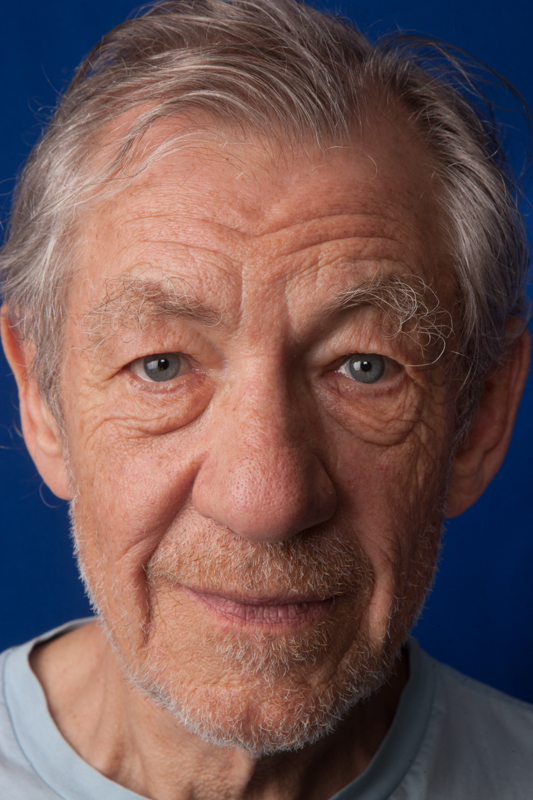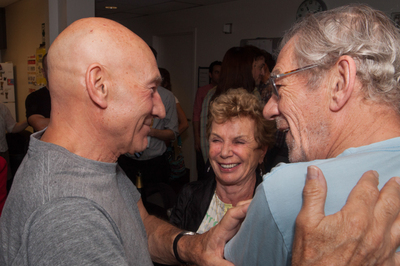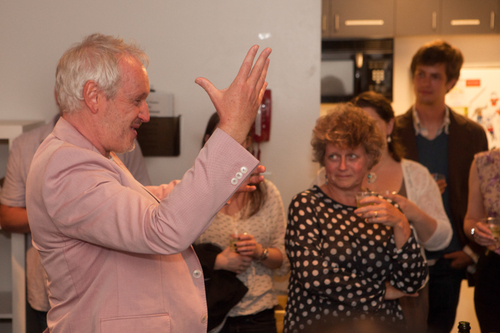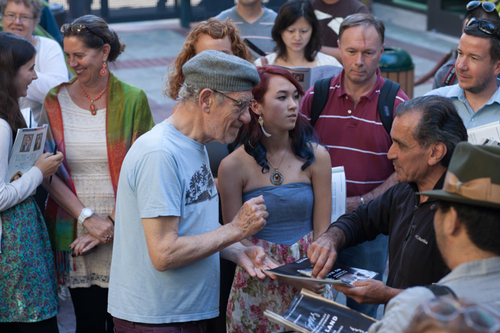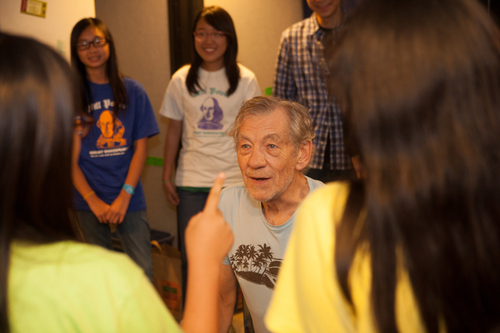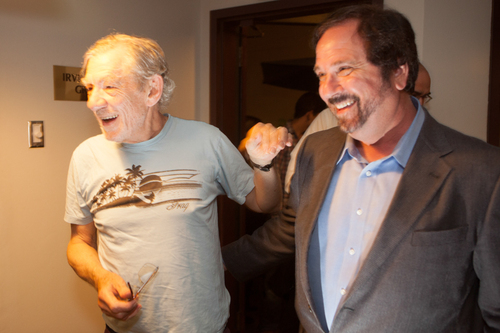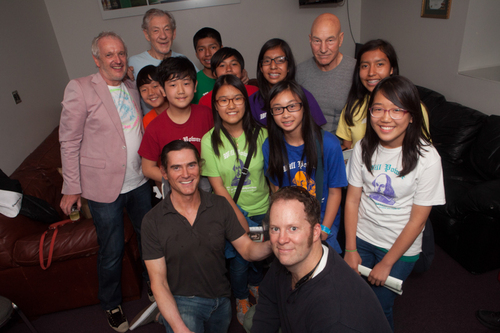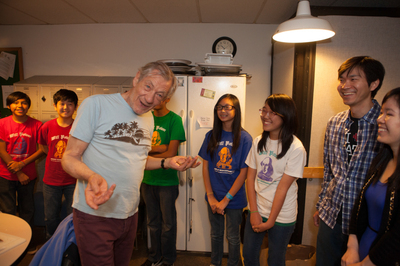It was the closing night of the Broadway bound No Man's Land by the brilliant playwright Harold Pinter, starring Sir Ian McKellen and Patrick Stewart. I was granted an interview and photo shoot with Sir Ian before the final performance at The Berkeley Repertory Theatre. The show opens on Broadway in October. As I entered Sir Ian's dressing room, he was napping on the couch, wearing a backwards flat cap and mock Hawaiian paradise shirt that said "Iraq," hinting at the lesser known comedic side of his personality.
In preparing for the interview, I watched the 1978 film of the stage production of No Man's Land where legendary Sir John Gielgud played Spooner, the same role Sir Ian plays in this production. The performance that night was hilarious in stark contrast to the original, filmed version, which came off darker and more serious. The current version was presented in a much more humorous way, contrasting the very dark subject matter of three hard drinking, manipulative men and their victim.
Harold Pinter's No Man's Land is an intriguing play, deftly performed by the cast of four which includes three Tony Award winners (Sir Ian, Billy Crudup and Shuler Hensley). In Berkeley it felt like an incredibly unique performance.
Sir Ian McKellen and Patrick Stewart -- Photo by Jamie Soja
Backstage at the Berkeley Rep -- with the electric hum of a nearby soda machine steadily droning -- we started our interview with Ian still lounging on the couch.
Jamie Soja: If you could be remembered by any one role in your life which one would it be? (Ian pauses.) I know, it's like asking The Beatles what their favorite album was, or something like that but...
Sir Ian McKellen: Oh, I thank you for thinking it's something like that. (laughing) I suppose you'd have to discount anything in the theatre because, people are remembered... you know it dies with their memory, whereas things on film are potentially longer lasting than that. I am quite proud of a number of things. Gods and Monsters, which we were talking about earlier, Richard the Third, which I happen to help produce and write, so that was quite a big event for me, but then I wouldn't want to discount... Lord of the Rings.
Jamie Soja: I am sure many people look at No Man's Land, trying to decipher the meaning.
Sir Ian McKellen: Yes.
Jamie Soja: What do you think Pinter wanted to express? What is your interpretation?
Sir Ian McKellen: When I first saw it, I thought it was a difficult play to follow but now that I've worked with it, I don't find it difficult at all. I think it is pretty straightforward. The plot is pretty simple. Two strangers meet in a pub and go back to one of their houses and affect each other's lives... is basically what it is. (Pauses to take a phone call from Rafe Esquith.) What were we talking about, me failing to answer questions? (laughing)
Jamie Soja: Deciphering No Man's Land.
Sir Ian McKellen: Ahh, yes, yes. The part that Patrick Stewart plays is a man whose memory is shot to smithereens by age and alcohol and he has only a tentative hold on his memory, or indeed where he actually is at any one time. So if you are in his life your choice is to either, what's the word, indulge him by pretending he's making sense or by shaking him and saying, "pull yourself together." My character does a bit of both, to no effect. So the man is left open to being controlled by people who don't particularly wish him well. I think that story is fairly clear. But the details of it, when they are going into the reminiscence of the past, it's always the audience getting worried they don't know where they are and the characters don't quite know where they are. So I don't think it is a difficult play once you accept that is the situation, and also all the characters are drunk. It's like overhearing long conversations in a pub. Can you make head to tail of them? But written in the most exquisite language possible. Very funny.
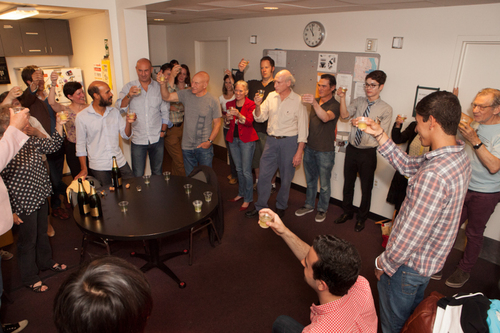
Jamie Soja: Often Pinter employs silence as a way of, "speaking of a language locked beneath," as he put it, which in No Man's Land appears to convey an underlying darkness, sometimes in the place of a response to a question. There is also a bit of dark comedy in his work. What about this is appealing to you?
Sir Ian McKellen: Yes, I think as Pinter himself said, the pauses and silences, which he marks in the script, are rather overrated... well not overrated, but there's been too much discussion as to what they mean, as Pinter said when he did this play himself as an actor. He cut half the pauses; they weren't necessary, or they've arrived in some other space. So basically what you've got is some sort of report as to what the first production was like with its pauses of various lengths. It's not that unusual to have a pause in a play (laughs), it's just that the playwright probably hasn't written it down. But you're right it is dark... it is dark. The old drunk man is being manipulated by two rather ruthless younger men who are really taking advantage of him. My character too, probably would do the same, given half a chance. There's not a lot of merriment, the characters are not very merry. Ah, but they are funny and that's another matter. So you've got the mixture of the darkness and the humor.
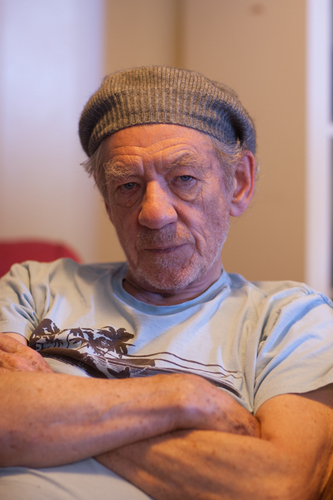
Jamie Soja: You perform the role of Spooner, which was originally performed by the great Sir John Gielgud. How do you feel you have been influenced by him and how have do you believe you put your own spin on the roles?
Sir Ian McKellen: Well normally I would poo-poo that question because I spent a lot of my time in the theatre playing parts that other people have played, and have been playing for 500 years. So I think of them particularly as mine. But, in this case I can remember quite a lot of what John Gielgud did with the part. It was very, very much his own. So it would be a fool who tried to do anything like he did because it was so personal to him. But it was a bother to me in rehearsal. I kept hearing Gielgud's voice, I did this afternoon at one point. I don't want him, he has nothing to do with me (laughing). But also the style of acting has changed. It's interesting, in the 35 years since this play was written... Gielgud and Richardson were thriving in the 1920's influenced by, therefore, Victorian theatre stage acting. So it would be likely we would be doing something a bit different in style of acting. Perhaps delving a bit deeper than other people have done when doing this play. But you're right: both Richardson and Gielgud have cast their spell over the play, for those of us who saw them do it. And Patrick who saw them do it three times I think in one week, vowed that he would one day do the play so he is very, very happy.
No Man's Land Director Sean Mathias -- Photo by Jamie Soja
Jamie Soja: I think it was Patrick who said that people gasped when Richardson fell because he was considered a national jewel or whatnot; workshops, I don't think there is such a place in LA.
Sir Ian McKellen: Whereas they don't care when Patrick Stewart falls (laughing). Yes, for actors that has become one of the famous things you need to do in that part. Richardson appeared to fall like that, which is almost impossible to do, unless you are unconscious. But Patrick does something very inventive, but different.
Jamie Soja: Why was Berkeley chosen as a location for the previews, why not LA?
Sir Ian McKellen: Well because there's not a theater like this in Los Angeles. It's a not-for-profit, established theater, with rehearsal rooms and everything you need to put on a show. Oh, there is the Music Center, I guess you would say. We considered La Jolla and Berkeley, those are the two.
Keith (Ian's publicist): I think, maybe, you wanted to go somewhere you hadn't been before.
Sir Ian McKellen: Oh, no I don't think that was a consideration, but it was a happy outcome. I think that, really, it was an organization used to doing this sort of play, that wouldn't surprise the audience that they were seeing an old Pinter play for the first time. The enthusiasm of the mailing list was so strong that tickets were never put on sale to the general public, so the orders were getting out to pretty discerning, with long-established theater-goers. So that's a really nice way to put on a play.
Jamie Soja: Have you heard that Berkeley is the birthplace of the free speech movement? So there is a long history of art, culture and counterculture here.
Sir Ian McKellen: Yes, yes, and it's a very congenial place to be. We're all living close to the theater, we're not lost in a big city. It's been good.
Jamie Soja: What intrigues you about theatrical productions in front of a live audience compared with making movies?
Sir Ian McKellen: Well it's my life. In a film there isn't a live audience so there's no comparison really. I'm not saying one is better than the other, but they are different. You can get into terrible trouble if you do have an audience and you are recording for film. I've just been doing that for a sitcom in the UK, very tricky. Both ways of telling stories are very demanding of actors. I always miss an audience when I am filming and I must say of late, I miss the camera when I am on stage.
Jamie Soja: Do you feel nervous or anything in front of a live audience?
Sir Ian McKellen: No, I don't know why, but so far....
Jamie Soja: That's a sign of a professional, I guess.
Sir Ian McKellen: Well, there have been occasions... I wished it hadn't been happening but very, very rarely. No, I enjoy it too much.
Rafe Esquith -- Photo by Jamie Soja
[Rafe Esquith, educator, supporter and founder of the Hobart Shakespeareans, was not able to make it to the interview. Rafe brought along a number of current and former Hobart Shakespeareans to the play later that evening and the students had a chance to meet with Ian and converse about the play after the performance. The following set of questions relate to Sir Ian's relationship with the Hobart Shakespeareans, who Ian has been supporting for decades.]
Jamie Soja: You said, "there is a lot of love alongside the disciplined hard work that Rafe [Esquith] insists on." How has love and discipline taken it's place in drama for you?
Sir Ian McKellen: Well discipline is very important, isn't it? You do eight shows a week. You have to organize your life around that. People think you are just wandering in to do two hours a day, not really. The day starts the minute you get up. And love, yes, and respect for the author that's what you're doing it for. You're at his or her service. The work that Rafe gets out of his students is astonishing, and it would make many professional actors feel a little bit ashamed. They work so hard in hours, so diligent. And considering English probably is their second language -- that they've come to grips with Shakespeare and language of very, very difficult Shakespeare -- is incredible. I haven't met any actor who has seen them at work who hasn't been extremely moved.
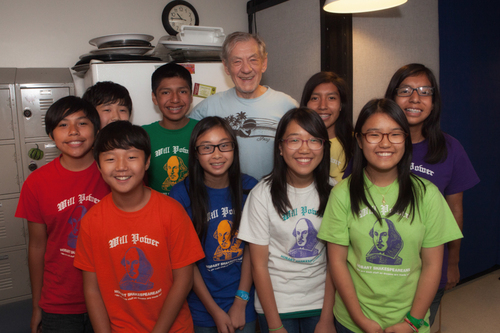
Sir Ian and the Hobart Shakespeareans -- Photo by Jamie Soja
Jamie Soja: Did you see them when they came to London when they performed at the Globe?
Sir Ian McKellen: I didn't see them really do anything there but I think they probably have the most impact when they are in their schoolroom: such an unlikely place to put on a play. The sandwiches are always good afterwards. The music's good. In front of your eyes you see young people who are just so full of achievement and liveliness at an age where many of their peers are probably wondering how much more they've got of school, if they will ever get a job and are probably not looking forward to much of a future, but these are high achievers. I'm a big fan of what goes on in that school. I first met Rafe and that generation... was it the 1980s or '90s? (aside to his publicist.)
Keith (Ian's publicist): It was in the '80s, late '80s, '88 I think.
Sir Ian and the Hobart Shakespeareans -- Photo by Jamie Soja
Sir Ian McKellen: Yeah, I was doing a Shakespeare show at what is now the Geffen Playhouse in Westwood, and at one matinee there were, from what I remember, 30 to 40 of these 12-year olds joining in, shouting out, naming Shakespeare's plays, which is what I was encouraging them to do. Then I went to visit them on their own turf. So live theater's been a big part of my connection with them and it's quite typical of Rafe that he should bring some 12-year olds to see No Man's Land which some adults find a bit difficult, but these kids have done Measure for Measure, a play I don't understand. They've done King Lear, a play I've worked on for months and months and months and still wouldn't say I understand, and they've presented both of those plays in absolute clarity of intention and thought. Astonishing! Whether that comes from love or hard work or diligence, I don't know but it happens.
Sir Ian and Rafe Esquith
The cast of No Man's Land with director Sean Mathias and the Hobart Shakespeareans
Jack Morrissey (Ian's friend, of Team Jack podcast): I have one more question, has anybody asked you about Richard the Third's remains coming out of that parking lot? Did you have any reaction when you found out they found him under there? I guess now he's going to be reinterred at York Minster. Any plans to visit?
Sir Ian McKellen: (laughing) I don't feel any connection to him whatsoever, but of course that was astonishing. In a municipal car park where there happened to be a letter, "R," (I suppose, "R," for reserve marking someone's space) they decided, just as a joke to start on the, "R," and it was under the, "R," that they found the body and other bodies too. But the surprise to everyone was that Richard the Third did have something wrong with his spine and it was a bit disturbing to see the supporters of Richard who claimed he was good king, and that part of his goodness was that he was in immaculate physical shape, and the woman cried when she discovered that Third was actually what his enemy's always said he was: deformed, short, good looking, but with a bad back. This makes his exploits on the battlefield even more remarkable because he was severely constricted. All the discussion of what to do with remains, the fascination of it being discovered and the possibility of, on the skeleton, working out what he looked like, identifying his height, etc., etc., that's all fascinating and draws attention to the fact that Shakespeare's plays has not much to do with the real character at all. I don't know whether Shakespeare would have claimed it was a history play. He called it a tragedy but other plays, he calls histories. And anyway the history around at the time written by Thomas More, and others, was no more reliable than Shakespeare. So what is history? It is always a distortion I suppose, isn't it?
Jamie Soja: I wonder how much propaganda had its part?
Sir Ian McKellen: Yeah.
Jamie Soja: What's the quote? "History is written by the victor?"
Sir Ian McKellen: Yes. And I've heard that Henry VII moated the princes in the tower because of course they stood in the way of his succession. No wonder he blamed Richard.
Sir Ian's will be performing No Man's Land and Waiting for Godot in a limited season repertoire with Patrick Stewart on Broadway, New York City. They will be alternating both plays during the same run at The Cort Theater with the same four-person cast. Sir Ian will also play Sherlock Holmes for Bill Condon in A Slight Trick Of The Mind as well as co-star in X-Men: Days of Future Past scheduled for a 2014 release.
Don't miss No Man's Land and Waiting for Godot, at The Cort Theater in New York City for 14 weeks starting Oct 26, 2013.
For more of Jamie Soja's photography and writing visit here
Photo by Jamie Soja
Correction: In a previous version of this post, the author incorrectly identified the playwright Harold Pinter as Howard Pinter. It has since been corrected.
